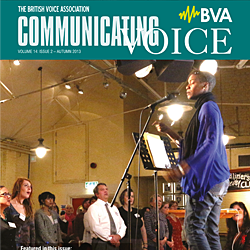About the Association
Archived newsletter articles
Embracing Alexander
By James Boyd, April 2001
I am one of those often referred to at British Voice Association (BVA) events as 'The Alexander People'. Our work is generally ill-understood and little known outside the performing arts. We are currently embroiled in preparation for impending self-regulation, having to make our minds up about being therapists or teachers. This Alexander teacher is very much a teacher who teaches a technique, not in the sense of a medical procedure, but a way of working.
Before taking the statutory three years to train on a STAT- (Society of Teachers of the Alexander Technique) approved teacher training course, I had been applying Frederick Matthias Alexander's way of working in a very broad-based performing career, still ongoing, and coupled with teaching singers and actors in the many performance fields in which I too have worked. There can't be many teacher/performers like myself who, having graduated from one of the Royal Schools of Music, have gone on to embrace Alexander Technique beyond the college experience, and use it in every aspect of their work as an essential tool.
FM Alexander was known as 'The Breathing Man' and it is in establishing for pupils a reasonable and efficient means whereby they can manage their breathing, that Alexander's way of working really scores. This is not black art, but applied common sense - that is, sense that we have to allow to dissipate. His way of working is taught and learned, then used. It evolved through scientific self-observation of his own condition in performance. Alexander's unfortunate experiences, familiar to many performers and professional voice users to this day, placed his acting career and his livelihood in jeopardy. A century later, the same difficulties present themselves at my teaching studio.
The most serious disorders "presenting" in my teaching work come from the pop world where poor use or indeed misuse is not only tolerated, but often encouraged in order to perpetuate and conform to a style of performance which itself originated in misuse. Rehabilitation, using Alexander's way of working, comes as a bolt from the blue for those pop idols rendered idle by lack of knowledge and the inevitable visit to their nearest ENT department.
Using Alexander Technique to establish a way of working where none existed before, provides the stability and confidence of having a learned skill yet the pupil doesn't sound like a "trained singer" - heaven forbid! I am often asked, in decidedly breathy tone, if the questioner will get his or her old voice back. I reply that I hope not. The restored and rehabilitated instrument will, if Alexander's way of working is given a chance, be founded upon better use of the instrument and greater awareness of its functioning. Think of that process being akin to having your golf swing completely reworked: disorienting, but ultimately advantageous. To a greater or lesser extent, we all look at our pupils, or patients, with a practised eye. Alexander Technique lets me take that observation a stage further and, with hands to the body and words to the mind, enables this teacher to restore a more reasonable and balanced state of use in the whole organism, thus optimising its potentials in performance.
This Alexander Technique business, then, is very much about teaching people to think, not currently a particularly popular pursuit, which may explain why study is still largely confined to those who take responsibility for themselves. Sir Edward Elgar considered singers to be unthinking musicians; at least he called us musicians!
Looking with the practised eye and listening to the instrument when it first arrives, my singing teacher hat sits atop years of experience and knowledge gained from the art of teaching classes, and the generosity of BVA folk like Van Lawrence, Tom Harris, Arnold Maran, Colin Watson, David Howard and others. The workshop manual is pretty well digested by now; Alexander Technique provides the hands that work to unravel the instrument, rather like peeling an onion, to which singing has always been likened. Sometimes the tears take a while to stop, but there is always an improvement. I have yet to come across a case of vocal disorder that is not in some way reflected elsewhere in the whole organism. Alexander Technique provides this voice teacher with a reliable means whereby that misuse can be identified and, with application, be rehabilitated. There are of course those whose defects trouble them not a whit, but they too can benefit as much as anyone. The Technique is not for people with other fish to fry, nor for those who cannot bear to be wrong, for it involves thinking and many singers prefer to rely on a rabbit's foot in their tailcoat pocket.
Alexander Technique is work: work that can be undertaken in practising and in performance to largely overcome the neck-stiffening that afflicts so many singers and other professional voice users. Alexander's way of working, without scolding or pushing to get it right (end-gaining), serves to form a remarkable bond between teacher and pupil. The ability to be aware of and learn from mistakes resulting from misuse, leads to a constructive learning process and a truly professional approach to performing. Although it is work all of this, it is too serious to take seriously. My somewhat irreverent sense of humour would not have lasted in over 30 years of working with Alexander Technique were it in any way stifled. The Technique works. I see it work year in, year out, both for this hard-headed Scot and for others of a rather more genteel disposition. Forget the idea of it being all about posture. It isn't. Neither is it therapy nor treatment, although it can have a marked therapeutic effect. I am not an instrument manufacturer or a doctor but my work is scientifically proven and sound. And it works and that's what keeps me satisfied.
Alexander wanted pupils to have thirty lessons, as close together as possible, to give his psycho-physical re-education work a chance. Rather more than for the Department of Transport Driving Test, perhaps, but the human vehicle is just a little more complex. Now, where are my 'L' plates?
James Boyd is a BVA member, a professional tenor and teacher of singing with an international career embracing vocal music in many styles from oratorio and lied, to pop, folk, and musical theatre. He is a STAT registered teacher of Alexander Technique, based in Glasgow.
And for those who may not know…
F.M. Alexander (1869-1955), an actor who began his career as a Shakespearean orator, developed chronic laryngitis while performing. Determined to restore the full use of his voice, he carefully watched himself while speaking, and observed that undue muscular tension accounted for his vocal problem. He sought a way to eliminate that restriction. Over time, he discovered and articulated a principle that profoundly influences health and well-being: when neck tension is reduced, the head no longer compresses the spine and the spine is free to lengthen. Alexander restored his own natural capacity for ease by changing the way he thought while initiating an action. From this work on his self and others, he evolved a hands-on teaching method that encourages all the body's processes to work more efficiently – as an integrated, dynamic whole. (North American Society of Teachers of the Alexander Technique).
More archived content online
Disclaimer
Neither the British Voice Association nor the Editor can be held responsible for errors or any consequences arising from the use of information contained in its newsletters (or extracts from its newsletters published online); the views and opinions expressed do not necessarily reflect those of the British Voice Association (BVA) or the Editor, neither does the publication of advertisements constitute any endorsement by the BVA or Editor of any products or services featured.

 Join us Now!
Join us Now! our newsletter
our newsletter free voice care leaflets & information – download here
free voice care leaflets & information – download here Help our work by donating while you shop
Help our work by donating while you shop